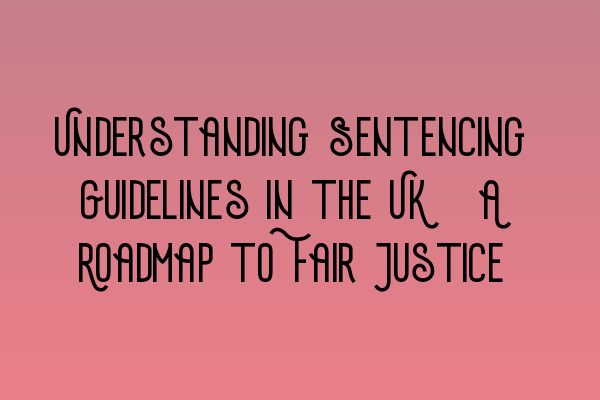Understanding Sentencing Guidelines in the UK: A Roadmap to Fair Justice
When it comes to criminal law, an important aspect of maintaining fairness and consistency in sentencing is the use of sentencing guidelines. The United Kingdom has established a comprehensive framework to guide judges and magistrates in determining appropriate sentences for different offences.
Before delving into the intricacies of these guidelines, it is important to understand the purpose they serve. Sentencing guidelines aim to promote consistency, transparency, and public confidence in the criminal justice system. By providing a structured framework for decision-making, these guidelines help ensure that similar offences receive similar punishments, regardless of the location or personal biases of the judge.
The Role of Sentencing Council in the UK
The Sentencing Council plays a crucial role in establishing and maintaining the sentencing guidelines in the UK. It is an independent body that works towards developing consistent, proportionate, and fair guidelines for different criminal offences. The Council consists of experts from various legal backgrounds, including judges, magistrates, and legal professionals.
These guidelines are not legally binding but carry significant weight in court proceedings. Judges and magistrates are expected to follow the guidelines unless they deem it necessary to depart from them due to exceptional circumstances. Such departures, however, must be justified and explained.
Understanding the Structure of Sentencing Guidelines
The sentencing guidelines are structured to ensure that the punishment for each offence aligns with its severity and the circumstances surrounding it. They are divided into various categories based on the type of offence (e.g., theft, assault, drug-related offences) and provide a range of potential sentences.
Each category is further broken down into sub-categories that consider aggravating and mitigating factors. Aggravating factors, such as premeditation or cruelty, can lead to more severe sentences, while mitigating factors, such as previous good character or remorse, can result in more lenient sentences.
To illustrate this, let’s consider a theft offence. The guidelines would take into account factors such as the value of the stolen property, the use of violence or threats, and the impact on the victim. Based on these factors, the guidelines would provide a range of potential sentences (e.g., community service, fines, or custodial sentences) to guide the judge or magistrate in their decision-making process.
Regular Updates to Reflect Changes in the Legal Landscape
The Sentencing Council regularly reviews and updates the guidelines to ensure they remain relevant and reflect changes in legislation and society. This ensures that sentencing decisions keep pace with developments in the legal landscape and societal attitudes.
It is crucial for legal professionals, including solicitors, barristers, and judiciary personnel, to stay updated with these changes to effectively represent their clients and ensure fair and just outcomes.
Preparing for the SQE Exams and Enhancing Expertise in Criminal Law and Practice
As an aspiring solicitor or legal professional specializing in criminal law, it is essential to develop a comprehensive understanding of sentencing guidelines and their application in practice.
To enhance your expertise and prepare for the SQE 1 exams, it is recommended to explore available SQE 1 Practice Exam Questions and SQE 1 Practice Mocks FLK1 FLK2 courses. These resources will help you familiarize yourself with the format and content of the exams, allowing for better performance and higher chances of success.
For those looking to specialize in criminal law, SQE 2 Preparation Courses can provide comprehensive training and knowledge in this specific area of legal practice. These courses cover various aspects of criminal law, including sentencing guidelines, to ensure a solid foundation for a successful career.
Keeping track of the SRA SQE Exam Dates is crucial to plan your study schedule and allocate sufficient time for exam preparation. By staying organized and well-prepared, you can approach the exams with confidence and increase your chances of achieving a favourable outcome.
In Conclusion
Sentencing guidelines play a vital role in ensuring fairness and consistency in criminal law. They provide a roadmap for judges and magistrates, helping them determine appropriate sentences based on the severity of the offence and its surrounding circumstances. By staying informed about the ever-evolving sentencing guidelines and preparing adequately for the SQE exams, aspiring legal professionals can equip themselves with the knowledge and skills necessary to navigate the complex world of criminal law and practice.
